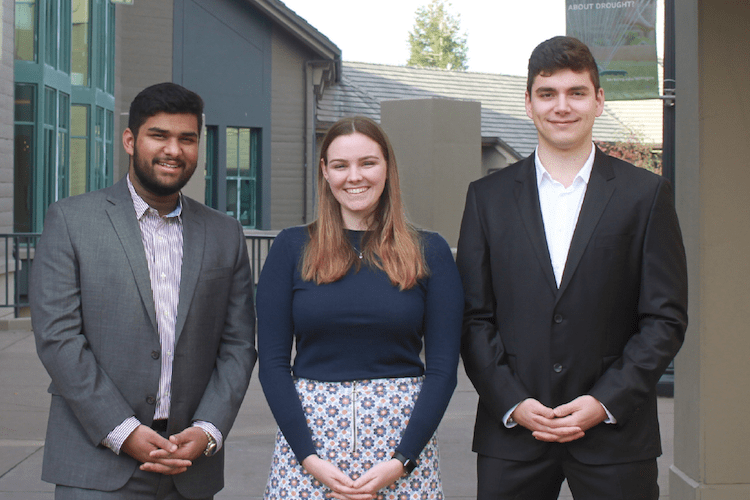Summit energizes hundreds of MBA students to lead climate innovation

Chou Hall uses about half as much water per square foot as other Haas buildings. All of Cafe Think’s coffee grounds are used as garden compost by UC Berkeley’s Gill Tract Farms. And Haas students print 77,000 pages—or about four tons—of paper annually.
Those are just a few facts unearthed in the first-ever student-authored Berkeley Haas Sustainability Report, published this week by the Haas Business School Association’s (HBSA) Sustainability Committee. The report is a sweeping overview of where the school stands with its sustainability efforts in its buildings, classrooms, and centers.
“This was our way of going beyond ourselves to give back to our business school,” said Tim Tembrink, BS 19 and vice president of sustainability for the HBSA. Tembrink worked on the report with Berklee Welsh, BS 20, and Shane Puthuparambil, BS 22, (environmental science and business.) “Writing the report was a journey from the beginning to the end of the semester,” Tembrink said. “We spoke to every single person we could find and everybody was so interested in the report and interested in helping us.”
Tembrink said he hopes that the 25-page report will be used for internal purposes or for Haas to showcase its sustainability-related initiatives outside of Haas.
Taking a leadership role
Robert Strand, executive director of the Center for Responsible Business, and Prof. Laura Tyson, former Haas dean and the faculty director for the Institute for Business & Social Impact (IBSI), commended the students for their work. “We stand at a critical point in history,” they wrote in a letter published with the report. “The sustainability challenges confronting the world are significant and mounting faster than anticipated. Berkeley Haas is well positioned to assume a leadership role among business schools to address these challenges and leverage the power of business to drive positive change.”
The report includes details of energy, waste diversion, and water use in different campus buildings—including Cheit Hall, the Barbara & Gerson Bakar Student Services Building, and the Faculty Building, with a special focus on Chou Hall, which was just certified as the greenest business school building in the country. Chou Hall recently earned TRUE Zero Waste certification at the highest possible level along with a LEED Platinum certification for its energy efficient design and operation.
The team worked closely with UC Berkeley campus groups to collect data on energy and water use, waste diversion, and supplies usage. UC Berkeley’s Energy Office, for one, has developed an energy dashboard to help monitor energy use anomalies across campus. (Haas is aligned with new campus-wide energy goals, include reducing energy use intensity by 2% annually, adding renewable solar energy, and shifting to 100 percent clean electricity from off-campus sources.)
Gathering the data
Welsh said the most difficult part of the project was compiling information across the U.C. Berkeley campus and beyond. “From accessing individual water meter data, to interviewing Cafe Think staff, facilities managers, and more, we found that no single individual had access to all of the information we needed,” she said.
Writing the report was of particular interest to Tembrink, who is launching a line of women’s clothing called Foundationals this spring. Foundationals’ first product, a sweater to be sold on the company’s website, aligns with Tembrink’s commitment to the environment. It’s made from 48 percent recycled water bottles and 52 percent recycled cotton. It will also be produced in a LEED-Platinum certified factory in Vietnam. “It’s a dream factory,” he said. “With regards to human rights and labor standards this factory was amazing.”
After Tembrink and his team graduates, they hope that the sustainability report will serve as a benchmark—and that future HBSA students will update the work annually.
“By compiling data in one place, we hope to provide students, staff, and faculty with a clear understanding of where Haas excels, and areas in which we need to improve in order to remain leaders in the fields of sustainability and business,” Welsh said.
Posted in:
Topics:



